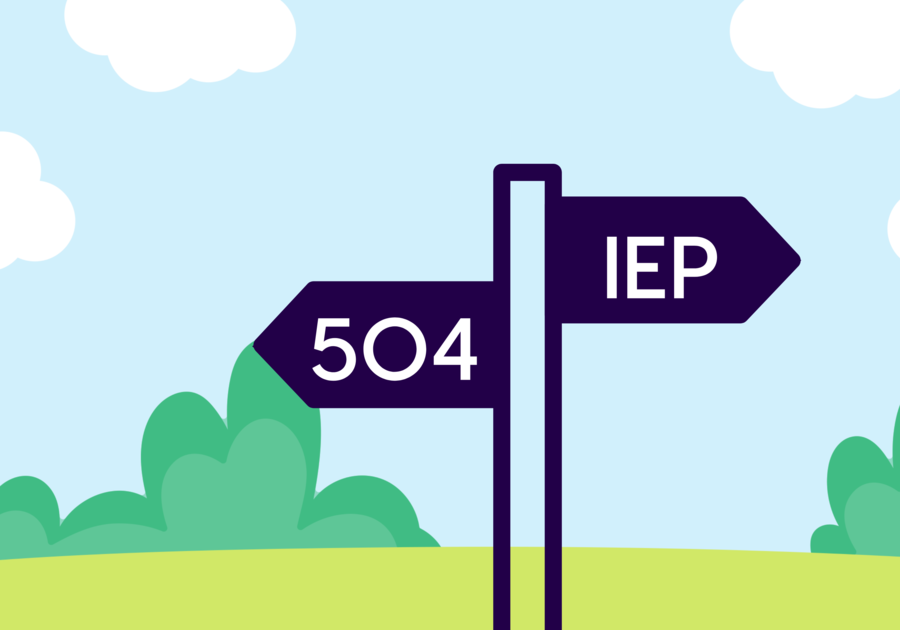At Huntington, we serve students of all levels of ability and achievement. If you have a student with unique learning needs or a learning disability, you’ve probably heard of the Individualized Education Plan, better known as an IEP, and the Section 504 plan. As a former school psychologist, I am often asked about the processes involved and the differences between an IEP and 504. Both plans offer accommodations for students from kindergarten through twelfth grade and allow students with learning difficulties to receive help if they qualify. I hope this information helps you feel more informed if you are considering one of these plans.
It is important to note that these two plans are not the same. Both the IEP and the 504 plans are intended to help students with disabilities succeed in the classroom, but parents often want to know how exactly. Each plan has a different process and requirements. Prior to considering these processes, it is important to understand the similarities and differences, especially if you have a concern regarding your child.
What is an IEP?
An IEP is a written document created for each child who receives any special education and related services from their school. The IEP is covered under Part B of the Individuals with Disabilities Education Act (IDEA).
The process for an IEP begins when a student is identified through the psychoeducational evaluation process after limited growth in school with intervention. Often a teacher or parent will suggest that a child be evaluated for eligibility for special education services. Once a student is identified as having a disability as defined by IDEA, the school’s IEP team meets with the parents to discuss any concerns and needs of the student. At this point, an IEP is written that parents, teachers, and others involved in the child’s education each review. The document identifies any accommodations, modifications, and supports that must be provided to the student.
What is a 504 plan?
Section 504 of the Rehabilitation Act of 1973 protects qualified individuals from discrimination based on their disabilities. The 504 plan is developed by schools to ensure students with disabilities are given equal opportunity to succeed. If a student’s disability is substantially limiting their ability to fully participate in academic and non-academic activities, the school must provide accommodations. Those might include preferential seating, allowing frequent breaks, extra time on tests, or a quiet room to take quizzes/exams. Please note that these are accommodations, not the modifications that an IEP provides.
What’s the difference between an IEP and a 504 plan?
- IEPs include information about a student’s level of performance and learning goals as well as their progress throughout the year. 504 plans do not.
- Because IEPs include academic goals, benchmarks, measurements and more, they tend to be more thorough than 504 plans. 504 plans often involve fewer people from the school to create.
- IEPs are created for students who need specialized instruction to learn effectively in a typical classroom curriculum. The disability categories defined by IDEA that qualify a child for an IEP are well-defined.
- 504 plans are often created for students who are capable of learning and succeeding in the classroom alongside their peers if provided the right accommodations. So, students who have a disability as defined by IDEA might receive a 504 plan instead of an IEP if that better suits their needs. An example of this is a student with ADHD who simply needs additional time to complete assignments and tests and a quiet room for test-taking.
If your child is struggling in school and you know it is at least in part due to their struggles with a learning disability or other learning issue, your first step should be to explore your student’s eligibility for either a 504 plan or an IEP. The easiest way is to work as part of the team with your child’s school. Each school has teams to work with students and families for these processes.
Huntington can help too! Our tutoring programs are comprehensive and see great results. We help students gain critical skills they will use in school and the rest of their lives, such as time management, organization, focus and more.
 |
Still need help, reach out to Huntington Learning Center, Weddington. Huntington has been the nation’s recognized leader in educational services since 1977. Our mission is to give every student the best education possible. At Huntington Learning Center - Weddington, we offer children, ages 5 to 17, tutoring in Reading, Writing, Mathematics, Study Skills, Phonics, Vocabulary, Science, and SAT and ACT Preparation. Our individualized instruction is developed from comprehensive academic evaluations completed at the center. We are committed to the success of each student through this personalized instruction with our certified teachers. Each program is uniquely designed to develop the skills, confidence, and motivation for the student. We are seeing great strides every day!



